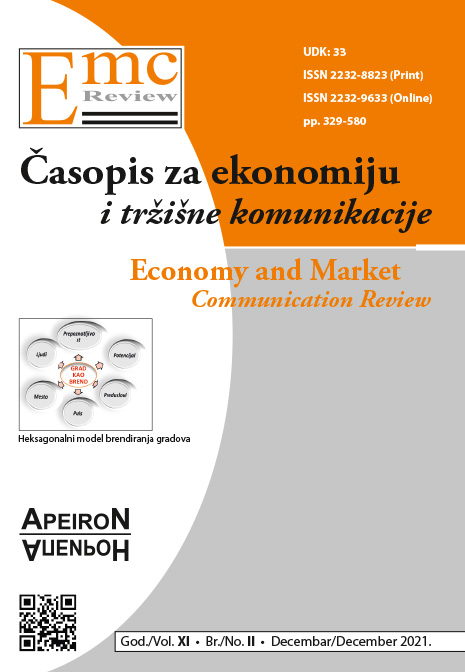CORPORATE REPUTATION MODELLING AS VITAL ENTERPRISE VALUE FOR STAKEHOLDERS: STRUCTURAL EQUATION MODELLING PERSPECTIVE
DOI:
https://doi.org/10.7251/EMC2102526ZAbstract
Many research studies suggest that the increasing competitiveness of the global economy emphasizes the importance of identifying the drives of sustainable competitive advantage in the intangible domain. This research aims to, according to resource-based theory of the enterprise, model corporate reputation as an invisible resource of the enterprises that enables the creation of the various advantages such as customer satisfaction and gaining loyal customers that further leads to creating competitive advantage and superior business performance. The research aim is to determine the significance and intensity of the simultaneous relationships between corporate reputation, presented as a construct composed of two elements: competence and likeability, and customer satisfaction and customer loyalty. It seeks to determine the significance of the mediator customer satisfaction in the relationship between corporate reputation and customer loyalty. Research data are collected by a survey questionnaire fulfilled by 116 respondents to participate in the research on enterprises from the telecommunication sector of transition economy Republic of Srpska, Bosnia and Herzegovina. To test the proposed research model partial least squares structural equation modelling (PLS-SEM) is applied. Prior to application of the PLS-SEM certain preliminary data and sample analysis are performed. The presence of outliers and requirements of the sample size for PLS-SEM evaluation are examined. To determine whether final sample size is appropriate to conduct PLS-SEM analysis both rule of thumb and results of the analysis made by G*Power software were used. Construct likeability has nearly two times stronger direct effect on customer satisfaction compared to other element of corporate reputation called competence. Only one element of corporate reputation called likeability has significant direct effect on final target endogenous construct customer loyalty. Customer satisfaction has strong significant direct effect on customer loyalty. Beside direct effects of the latent constructs corporate reputation and customer satisfaction on customer loyalty, mediation analysis is performed to test the significance of the mediator called customer satisfaction. Research results indicate the importance of the mediator customer satisfaction in the relationship between corporate reputation and customer loyalty. According to them, both elements of corporate reputation have significant indirect effect on customer loyalty. Likewise, research results enable ranking of the exogenous factors that create and improve corporate reputation. Directing the management attention towards improving certain exogenous factors ensures the development of certain corporate reputation elements – competence and likeability, and provides efficient and effective corporate reputation management. It is revealed that corporate social responsibility, promoting products’ and services’ quality and better business performances improve competence element of corporate reputation, while corporate social responsibility and investments into raising the attractiveness of the enterprise positively influence sympathy and likeability of the enterprises from a stakeholder perspective.
